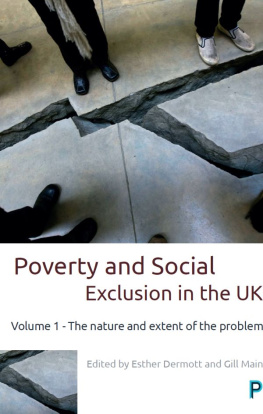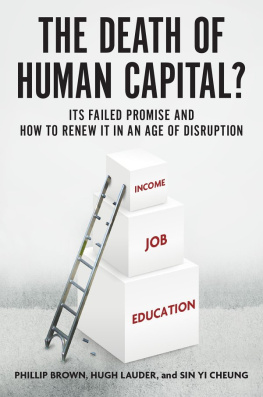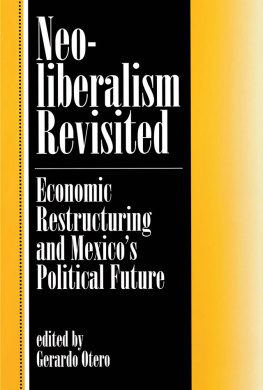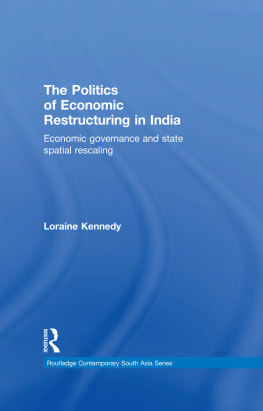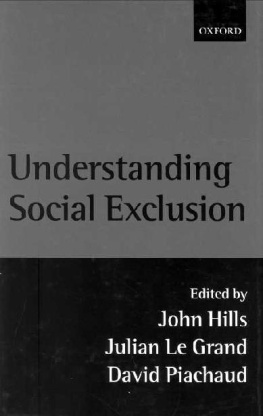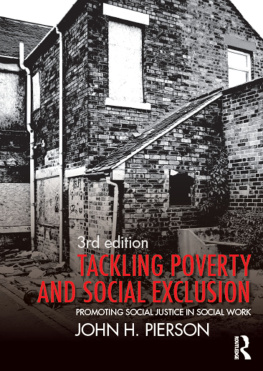First published in 1994 by UCL Press Limited
This edition first published in 2018
by Routledge
2 Park Square, Milton Park, Abingdon, Oxon OX14 4RN
and by Routledge
711 Third Avenue, New York, NY 10017
Routledge is an imprint of the Taylor & Francis Group, an informa business
1994 Philip Brown, Rosemary Crompton, and contributors
All rights reserved. No part of this book may be reprinted or reproduced or utilised in any form or by any electronic, mechanical, or other means, now known or hereafter invented, including photocopying and recording, or in any information storage or retrieval system, without permission in writing from the publishers.
Trademark notice: Product or corporate names may be trademarks or registered trademarks, and are used only for identification and explanation without intent to infringe.
British Library Cataloguing in Publication Data
A catalogue record for this book is available from the British Library
ISBN: 978-1-138-49942-3 (Set)
ISBN: 978-1-351-01463-2 (Set) (ebk)
ISBN: 978-0-8153-5160-3 (Volume 19) (hbk)
ISBN: 978-1-351-14132-1 (Volume 19) (ebk)
Publishers Note
The publisher has gone to great lengths to ensure the quality of this reprint but points out that some imperfections in the original copies may be apparent.
Disclaimer
The publisher has made every effort to trace copyright holders and would welcome correspondence from those they have been unable to trace.
Economic Restructuring and Social Exclusion
Edited by
Phillip Brown & Rosemary Crompton
University of Kent at Canterbury
Phillip Brown, Rosemary Crompton, and contributors 1994
This book is copyright under the Berne Convention.
No reproduction without permission.
All right reserved.
First published in 1994 by UCL Press
UCL Press Limited
University College London
Gower Street
London WC1E6BT
The name of University College London (UCL) is a registered trade mark used by UCL Press with the consent of the owner.
ISBN:
1-85728-149-7 HB
1-85728-150-0 PB
British Library Cataloguing in Publication Data.
A catalogue record for this book is available from the British Library.
Typeset in Baskerville.
Printed and bound by
Biddles Ltd., Guildford and Kings Lynn, England.
Rosemary Crompton & Phillip Brown
I
As the 20th century draws to a close, the economic and political changes in contemporary Europe seem to be as profound as those that dominated the concerns of Sociologys founders in the 19th and early 20th centuries - economic crisis, nationalist wars, and social instability. Nevertheless, in western Europe the compulsion of economic necessity, as well as a determination to try to control the propensity to military adventure that has dominated European history, has resulted in the creation of the European single economic market. The Single Market among the 12 member states has formed an alliance with nations who are part of the European Free Trade Association (EFTA) to provide a barrier-free market of approximately 400 million people in 19 countries.
However, the parallel shifts to political integration, together with attempts to create a single currency, have proved to be far more difficult ambitions to realize. They have raised the thorny and emotive issues of sovereignty, national identity, and democratic accountability. These facts are hardly surprising. Among the nation-states that now make up the European Community (EC), there has always been a wide variation in economic structures and national political complexions. In respect of economic issues, some sociologists have emphasised the significance of societal effects - that is, identifiable and relatively enduring national differences - which are manifest in key areas of economic activity such as organizational structure and functioning. These societal differences persist even when crucial variables such as technology, size, and industrial sector are held constant in cross-national organizational comparisons (Maurice et al. 1986). There are many other significant differences between the nation-states of Europe. In important areas such as industrial relations, for example, countries such as Germany are characterized by a broadly corporatist strategy, with the mutual involvement of unions, employers, and the state. In Britain, in contrast, corporatist attempts have been largely overshadowed by the voluntarism and conflict that have dominated employei-worker relations. There are also crucial, and long-standing, national differences in fundamental political matters such as the definition of citizenship. France, for example, holds to a universalistic definition of the term that, while emphasising equality, is not particularly tolerant of cultural difference - particularly when religious affiliation might seem to assume priority over allegiance to the state. Germany, in contrast, defines citizenship in a particularistic manner, in relation to volk or ethnic origin.
These kinds of differences are reflected in national responses to EC initiatives. Although, therefore, the Maastricht treaty is likely to be ratified by all EC member states, Britain and Denmark have negotiated special clauses claiming national exemptions from politically unacceptable parts of the treaty. The Conservative representatives of the British government have negotiated an opt-out clause on the single currency and exemption from the Social Charter, which relates to minimum wages, part-time work, working conditions, and so on. Douglas Hurd, the then Foreign Secretary, warned that such protective legislation would lead to the bad old days of the 1960s. This stance may be seen as an expression of the vanguard neoliberalism of the present British government. Nevertheless, the issue continues deeply to divide the British Conservative party, both inside and outside the House of Commons. The Danes have voted in a referendum to claim exemption from the single currency, and Mitterand suffered the embarrassment of the extremely narrow yes vote in France.






